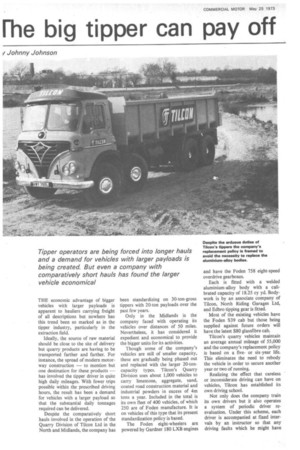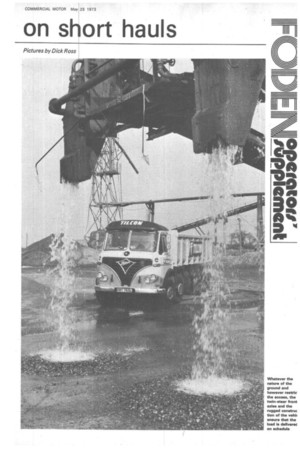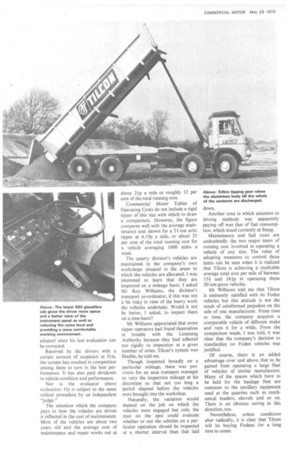The big tipper can pay off on short hauls
Page 88

Page 89

Page 90

If you've noticed an error in this article please click here to report it so we can fix it.
v Johnny Johnson Tipper operators are being forced into longer hauls and a demand for vehicles with larger payloads is being created. But even a company with comparatively short hauls has found the larger vehicle economical
THE economic advantage of bigger vehicles with larger payloads is apparent to hauliers carrying freight of all descriptions but nowhere has this trend been so marked as in the tipper industry, particularly in the extraction field.
Ideally, the source of raw material should be close to the site of delivery but quarry products are having to be transported farther and farther. For instance, the spread of modern motorway construction — to mention but one destination for these products — has involved the tipper driver in quite high daily mileages. With fewer trips possible within the prescribed driving hours, the result has been a demand for vehicles with a larger payload so that the substantial daily tonnages required can be delivered.
Despite the comparatively short hauls involved in the operation of the Quarry Division of Tilcon Ltd in the North and Midlands, the company has been standardizing on 30-ton-gross tippers with 20-ton payloads over the past few years.
Only in the Midlands is the company faced with operating its vehicles over distances of 50 miles. Nevertheless, it has considered it expedient and economical to provide the bigger units for its activities. Though some of the company's vehicles are still of smaller capacity, these are gradually being phased out and replaced with the larger 20-toncapacity types. Tilcon's Quarry Division uses about 1,000 vehicles to carry limestone, aggregate, sand, coated road construction material and industrial powders in excess of 4m tons a year. Included in the total is its own fleet of 400 vehicles, of which 250 are of Foden manufacture. It is on vehicles of this type that its present standardization policy is based.
The Foden eight-wheelers are powered by Gardner 180 LXB engines and have the Foden 758 eight-speed overdrive gearboxes.
Each is fitted with a welded aluminium-alloy body with a calibrated capacity of 18.25 cy yd. Bodywork is by an associate company of Tilcon, North Riding Garages Ltd, and Edbro tipping gear is fitted.
Most of the existing vehicles have the Foden S39 cab but those being supplied against future orders will have the latest S80 glassfibre cab.
Tilcon's quarry vehicles maintain an average annual mileage of 55,000 and the company's replacement policy is based on a fiveor six-year life. This eliminates the need to rebody the vehicle in order to secure another year or two of running.
Realizing the effect that careless or inconsiderate driving can have on vehicles, Tilcon has established its own driving school.
Not only does the company train its own drivers but it also operates a system of periodic driver reevaluation. Under this scheme, each driver is accompanied at fixed intervals by an instructor so that any driving faults which he might have
adopted since his last evaluation can be corrected.
Received by the drivers with a certain amount of suspicion at first, the system has resulted in competition among them to turn in the best performance. It has also paid dividends in vehicle condition and performance.
Nor is the evaluator above evaluation. I is subject to the same critical procedure by an independent "judge."
The attention which the company pays to how the vehicles are driven is reflected in the cost of maintenance. Most of the vehicles are about two years old and the average cost of maintenance and repair works out at about 24p a mile or roughly 12 per cent of the total running cost,
Commercial Motor Tables of Operating Costs do not include a rigid tipper of this size with which to draw a comparison. However, the figure compares well with the average maintenance cost shown for a 21-ton artic tipper at 4.19p a mile, or about 25 per cent of the total running cost for a vehicle averaging 1000 miles a week.
The quarry division's vehicles are maintained in the company's own workshops situated in the areas to which the vehicles are allocated. I was interested to learn that they are inspected on a mileage basis. I asked Mr Roy Williams, the division's transport co-ordinator, if this was not a bit risky in view of the heavy work the vehicles undertake. Would it not be better, I asked, to inspect them on a time basis?
Mr Williams appreciated that some tipper operators had found themselves in trouble with the Licensing Authority because they had adhered too rigidly to inspection at a given number of miles. Tilcon's system was flexible, he told me.
Though inspected broadly on a particular mileage, there was provision for an area transport manager to vary the inspection mileage at his discretion so that not too long a period elapsed before the vehicles were brought into the workshop.
Naturally, the variation would depend on the job on which the vehicles were engaged but only the man on the spot could evaluate whether or not the vehicles on a particular operation should be inspected at a shorter interval than that laid down.
Another area in which attention to driving methods was apparently paying off was that of fuel consumption, which stood currently at 8mpg.
Maintenance and fuel costs are undoubtedly the two major items of running cost involved in operating a vehicle of any size. The value of adopting measures to control these items can be seen when it is realized that Tilcon is achieving a creditable average total cost per mile of between 15; and 16+p in operating these 30-ton-gross vehicles.
Mr Williams told me that Tilcon is eminently satisfied with its Foden vehicles but this attitude is not the result of uninformed prejudice on the side of one manufacturer. From time to time, the company acquires a comparable vehicle of different make and runs it for a while. From the comparison made, I was told, it was clear that the company's decision to standardize on Foden vehicles was justified.
Of course, there is an added advantage over and above that to be gained from operating a large fleet of vehicles of similar manufacture. Many of the spares which have to be held for the haulage fleet are common to the ancillary equipment used at the quarries such as mechanical loaders, shovels and so on. There is an obvious saving in this direction, too.
Nevertheless, unless conditions alter radically, it is clear that Tilcon will be buying Fodens for a long time to come.
























































































































































